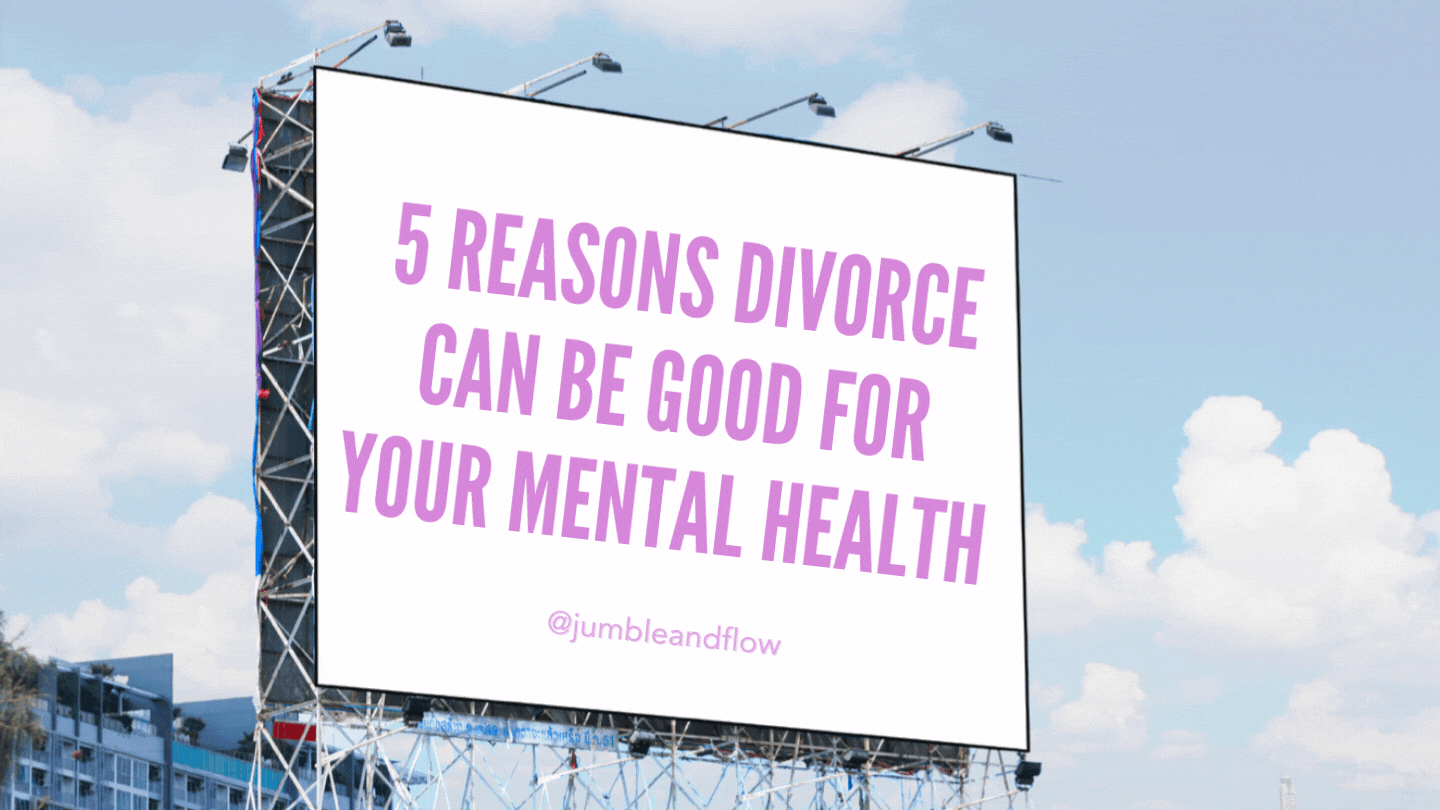
Top 5 reasons divorce can be good for your mental health
For over 10 years, I’ve supported women during tough seasons of life. The number-one request for referrals in my community, The Modern Domestic Woman, is around the topic of help surrounding divorce.
Addiction, financial stress, unfaithfulness, refusal to seek mental health support, differing opinions when it comes to raising their children—no matter why a woman seeks divorce, the messages they send to me are heartbreakingly laced with shame along with the stress of “failing” their kids. The chronic anxiety and grieving around their crumbling marriage leaves many women to avoid getting support. They’re often stuck in a loop of trying to smooth over a volatile environment a little bit longer to maintain a traditionally nuclear family and not f-up their kids.
One of my top concerns as a parent is the fear that I’m “screwing up my kids.” From incorrectly deciphering PMS moments to my “obnoxiously strict rules” about turning in phones before bed, my stress level when it comes to failing as a parent is high on a daily basis.
Question: Why do we moms always feel like we’re never doing enough to secure a healthy and happy life for our kiddos?
It could be the constant reminder of unrealistic expectations we’re up against when it comes to social media. Yet, I’ve noticed a quiet shift happening over the last decade and picking up momentum, where women are digging in their heels and saying, “I physically and emotionally cannot meet all the fabricated expectations society has molded into one pretty picture and maintain my own sanity.”
Divorce seems like the next step, but you’ve heard about how so many people stick it out until the kids are out of the house, so maybe waiting another 10 years would help the kids not suffer as much … right?
Wrong. “Children experience less anxiety and depression when their high-conflict, married parents divorce, and those children whose parents stay married with high-conflict experience higher levels of short- and long-term behavioral and mental health issues,” writes Ann Gold Buscho, Ph.D. and author of The Parent’s Guide to Birdnesting: A Child-Centered Solution to Co-Parenting During Separation and Divorce.
According to Gold Buscho, conflict between two parents puts children at risk — not necessarily divorce or continuing litigation.
Gina Hines, LCPC and owner of Alder Grove Counseling in Downers Grove and New Lenox, Illinois, explains that staying together to minimize disruption can lead to parental burnout and complicated mental health issues for the entire family. “If divorce is inevitable, it makes sense to look for support and resources and start the healing process right away,” Hines says.
While the exact reasons for a divorce may be unique and complex, other aspects of uncoupling can be very similar. I spoke with a experts on the topic of divorce to give you five reasons why divorce can be better for your mental health instead of gritting your teeth and bearing it until the kids get older.
1. You don’t know what stress you’re holding onto until it’s gone
S.K. divorced her spouse when her daughters were toddlers and said she doesn’t regret making that decision. She was scared, of course, but 15 years later, she shares her wisdom.
“Sometimes you don’t fully understand the burdens you are carrying until they are gone. When you get through it all, it is easier to breathe. You are lighter in body and spirit.”
S.K. had a very hard time calling it and saying her marriage was done.
“All of our disagreements were power struggles, and ultimately, his belief was that I should capitulate because he was the man/head of household,” explained S.K. “He was dealing with his own anger, depression, and PTSD.”
But what pushed S.K. over the edge was the abusive way he coped with and treated their disabled daughter.
“It took him blatantly saying [in therapy] that this was him — that I had to accept him as he was because he wasn’t going to change. And I thought, ‘No, I don’t have to accept this for me or for my daughters.’”
2. You (and a good lawyer) can figure out the financial part
Mollie Peskind, attorney at Peskind Law Firm in St. Charles, Illinois, focuses on the legal, financial, and emotional needs of her clients.
“It’s so rare that I see a client in a stable financial situation during the marriage leave the marriage destitute,” Peskind said. “But it’s extremely important to find out what your life is going to look like financially when you embark on divorce.”
Lawyers can give you an idea of what life will look like from a financial perspective and how to bring temporary relief to bridge the financial gap in between filing and finalization of divorce. Financial independence, or lack thereof, can be a big impediment.
“When a partner is not working and is controlled, (especially when it comes to money), they are typically unwilling to start the process of filing for divorce.”
Peskin encourages women to find a lawyer who can give them the information they need to start a new life with a bit of control, and not feel blind going into the process.
Peskin also stresses the importance of having any paperwork and information regarding personal finances, investments and property when attending a consultation with a lawyer. These documents can help give you an idea of what to expect with maintenance, child support and property division post-divorce.
“Everyone is nervous to file for divorce, especially when innocent parties, like kids, are involved,” Peskin notes. “Remember, you can lay ground rules during divorce proceedings to maintain respect for each other.”
Peskin ends every single consult by saying, “You’re going to be okay,” and she means it. “Finding support is crucial and a caring legal team can help guide you through this traumatic process.”
3. When the kids are happy, mama’s happy
Kate Durham of St. Charles, Illinois, divorced when her two daughters were elementary and middle school-aged. She feels her children’s lives are expanded, not diminished, now that she and her partner are not living in the same house.
“They are glad to spend time with just one parent or the other; sometimes it feels more special that way. And as both of us move on and potentially have new partners, they have an expanded network of adults who can support and love them. And we make every effort to include everyone—”original family” and new members in every birthday, holiday, [and] backyard BBQ we celebrate.”
While Kate knows this is not everyone’s experience, she shared that giving up the notion of making someone “the bad guy” in the relationship was fruitless, and she came around to realizing that both she and her ex deserved happiness.
“Then, you can focus on the things you so share together—your children.”
4. You won’t have to “fake it” anymore
Similarly to S.K. above, Kate also noticed an immediate change in her mood.
“You may feel like you are hiding the problem from your kids, but kids are highly intuitive. They feel the tension between you and your partner, no matter how convincing a mask you put on,” says Kate. “That can become extremely confusing for them and even cause them to feel responsible for parental arguments.”
“When my co-parent moved out, I felt lighter than I had in a long time. And I know my kids felt it; there was a palpable feeling of calm that came over the house.”
5. You can start modeling good relationships for your kids
S.K. kept thinking about the example she was setting for her daughters.
“I needed them to see an example of love in which partners are genuinely supportive and caring of and for each other. I wanted to be the relationship they could turn to to see true partners who bring out the best in each other. What they were witnessing was NOT that. But how could I expect them to end up in a healthy relationship one day when they were not growing up with that model? I didn’t want them to expect less than what they deserve … like I had growing up.”
Kate had similar thoughts and thankfully her spouse was in agreement that they should focus on making life great for their kids.
“When my co-parent and I decided it was time to move on, we did so in a way that put the children first. And we always, always made it a point to be good to each other, especially in their presence. In fact, our relationship now is better than it ever was when we were “trying to make it work.” We want our kids to know that just because we couldn’t live in the same house, we still care for each other and want what is best for the other, and that moving ourselves into a different way of relating is not a bad thing. Life, and people, change and we want to make sure our kids know that it’s okay to change.”
At the end of the day, your kids want to know they are safe and loved. Changing as a human being happens to all of us, and depending on the individual we call a partner, we might choose for them to grow with us, or we might not.
Kate moved on intentionally and believes she showed her kids how to set boundaries and process with them that it’s not the end of the world when things don’t go as planned.
“Did I set out to be a divorced single mom? Nope. But it happened that way and I dealt with it and all the stress that it caused. I didn’t let it get me down; my path bent a bit and I kept going. Ultimately I am stronger and better for it, living my life as I want to. And kids see that. They see everything you go through and how you handle it.”
Have you gotten a divorce and come out the other side better and healthier for it? Let us know in the comments.



